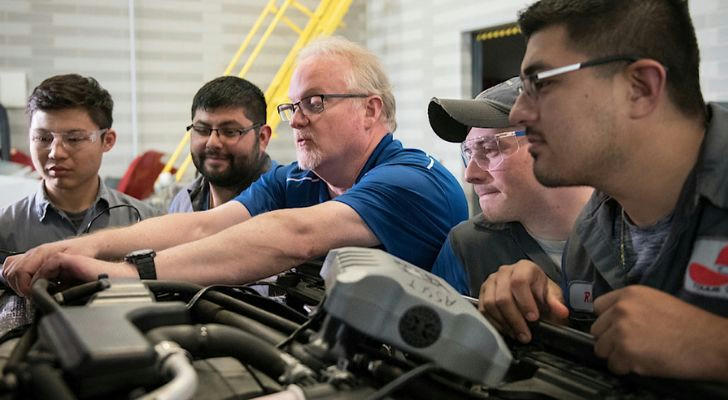Government-Supported Auto Mechanic Training: Learn While You Earn
The automotive repair industry offers long-term, well-paying career opportunities for skilled professionals. With government-supported training programs, aspiring auto mechanics can gain hands-on experience while earning an income, securing a stable job without accumulating student debt.

🚗 Why Choose a Career in Auto Mechanics?
Government-funded training programs provide an affordable route into the automotive repair industry. These programs, often supported by trade organizations and labor departments, offer structured curriculums, paid apprenticeships, and recognized certifications.
Job Security
The demand for skilled auto mechanics continues to rise. According to the U.S. Bureau of Labor Statistics (BLS), employment for automotive service technicians and mechanics is projected to grow by 6% from 2022 to 2032, in line with national job growth averages.
High Salaries
Auto mechanics can earn between $40,000 and $70,000 annually, depending on experience and specialization. The BLS reports that the median annual wage for automotive service technicians is around $46,000, with specialized technicians or those working in high-end dealerships making over $60,000 per year.
Affordable Training
Unlike expensive four-year college degrees, many auto mechanic apprenticeship programs cost little to nothing. Some even offer stipends to trainees. The Department of Labor estimates that auto mechanic apprenticeships save students up to $30,000 in tuition costs compared to traditional college programs.
Career Advancement
With the right training and certifications, auto mechanics can move into specialized fields such as diesel mechanics, collision repair, or automotive technology. Many experienced mechanics even open their own repair shops, significantly increasing their earning potential.
Work Anywhere
Automotive repair is an essential service worldwide. Whether working in residential repair shops, dealership service departments, or large-scale fleet operations, skilled auto mechanics are always in demand.
🛠 Training Programs & Certifications
✅ Certified Automotive Technician Programs
Courses covering the fundamentals of auto mechanics, safety procedures, and repair techniques.
Hands-on training with experienced professionals.
Certification opens doors to both government and private sector jobs.
💼 Department of Labor Registered Apprenticeships
Classroom learning combined with on-the-job training at repair shops, dealerships, and fleet maintenance facilities.
Apprentices earn while they learn, reducing financial strain.
Programs typically last 3-4 years and lead directly to journeyman mechanic certification.
🏫 Community Colleges & Technical Schools
Government-funded automotive courses available.
Partnerships with auto repair shops provide internships and networking opportunities.
Some institutions allow credit transfers for further education in automotive engineering or related fields.
🤝 Industry Partnerships
Collaboration between government agencies and trade associations ensures affordable training and job placement.
Programs integrate new automotive technologies, such as electric vehicles (EVs) and hybrid engines.
⚙️ Core Training Content
Auto mechanic trainees receive hands-on experience in:
Engine Repair & Diagnostics: Working with internal combustion engines, hybrids, and electric motors.
Brake Systems & Suspension: Learning to repair and replace brake systems, suspension, and steering components.
Electrical Systems & Wiring: Diagnosing and repairing automotive electrical and computer systems.
Transmission & Drivetrain: Working with manual and automatic transmissions, drive shafts, and differentials.
Climate Control & HVAC: Repairing air conditioning and heating systems in vehicles.
Green Auto Technologies: Training in alternative energy solutions such as electric vehicle repairs and maintenance.

💰 Salary Expectations
Auto mechanics have clear income growth potential, with salaries increasing based on experience and specialization.
| Experience Level | Monthly Salary | Annual Salary |
|---|---|---|
| Entry-Level (18-30 years old) | $3,000 - $4,000 | $36,000 - $48,000 |
| Mid-Career (30-50 years old) | $4,500 - $6,500 | $54,000 - $78,000 |
| Senior-Level (50+ years old) | $6,000 - $9,000 | $72,000 - $108,000 |
🌍 Nationwide Career Opportunities
The need for skilled auto mechanics extends across urban, suburban, and rural areas. As vehicles become more complex and diverse, from traditional cars to electric vehicles, job opportunities in automotive repair continue to grow.
According to the National Institute for Automotive Service Excellence (ASE), the increasing number of electric vehicles and advanced car technologies is creating even more job opportunities for skilled technicians.
🎓 How to Apply
Starting an automotive career is simple. Follow these steps:
📝 Pay the Application Fee – Some programs require a small $50 - $100 non-refundable fee.
📄 Provide Proof of Education – Submit high school transcripts, GED, or trade school certifications.
🗣 Meet Language Requirements – Basic English proficiency is needed for technical training.
📊 Pass Entry Exams – Some programs require a written or practical test.
🔧 Complete Hands-On Training – Participate in paid apprenticeships or internship programs.
📜 Earn Certification – Obtain a state-recognized mechanic license to start working.
🌟 Success Story: Mike’s Journey into Auto Mechanics
Mike, a 24-year-old high school graduate, wanted a stable, high-paying job without college debt. He enrolled in a state-funded automotive apprenticeship program, where he received hands-on training while earning $3,500 per month.
Within four years, Mike became a certified journeyman mechanic and secured a $6,500/month job ($78,000 annually). Now, he’s training to become a master technician, which could increase his salary past $90,000 per year.
“This career has given me financial stability. I love working with cars, and it’s rewarding to fix them and see customers leave satisfied!” – Mike, Licensed Auto Mechanic
🚀 Start Your Auto Mechanic Career Today!
Government-supported training programs provide a low-cost, high-reward pathway into the automotive repair industry. Whether you're just starting out or looking for a career change, auto mechanics offers financial stability, job security, and room for growth.
👉 Take the first step toward a successful career—apply today!
For more information on available training programs, visit National Automotive Training & Education.
